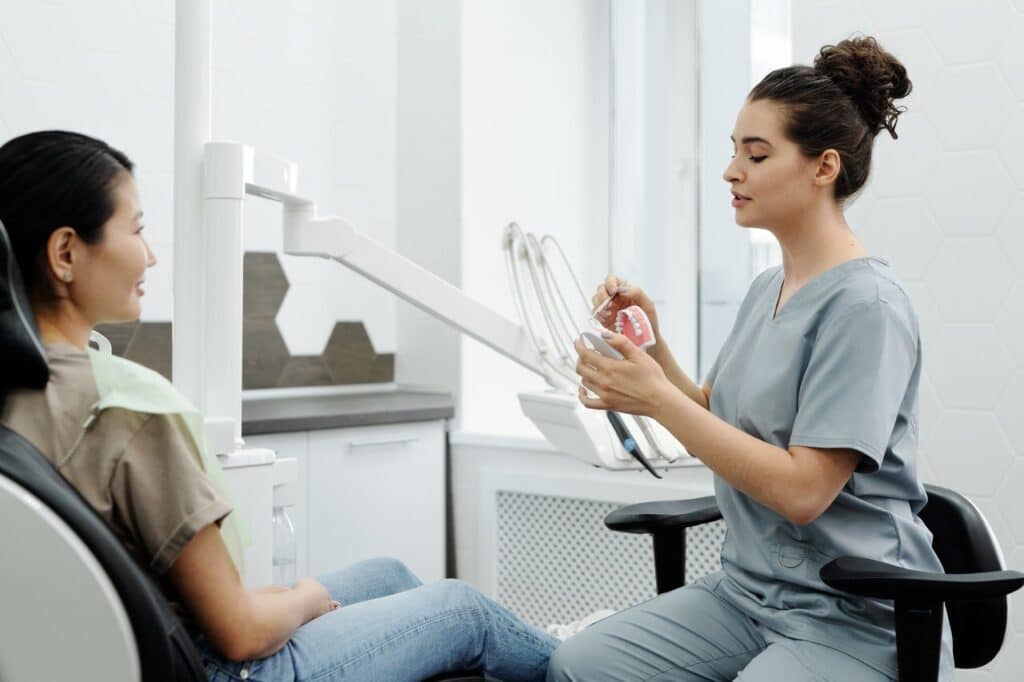If you hear popping, clicking, or grinding when you open your mouth to chew, speak, or yawn, the noise most likely comes from your temporomandibular joint (TMJ). You have a TMJ on each side that connects your lower jaw to your skull. It is a complex joint that allows all the movements you need to eat, speak, and breathe. These jaw noises may present an annoyance, but they also may indicate TMJ disorder that requires dental treatment.
What Causes My Jaw To Pop?
There are two common causes of popping or clicking sounds made by the movement of your lower jaw.
1. The jaw joint can make many movements because of its complex structure of bone, cartilage, and muscle. Occasionally, most people will make an awkward movement that causes a popping sound. This noise occurs when the lower jawbone moves over a slight bony elevation of the temporal bone. This typically happens when you hyperextend your lower jaw when opening too wide while yawning.
2. The second cause of popping is a movement of the TMJ disc inside the joint. This fibrous disc acts as a shock absorber between the bones of the lower and upper jaws. When the disc moves from its usual place, it can cause TMJ disorder and its symptoms, such as popping, pain, and limited mouth opening.
Symptoms
Other symptoms may accompany the popping sound associated with TMJ disorder. These symptoms include:
· Pain. You can experience pain in and around the joint, face, ear, temple, or neck.
· Locked jaw. A dislocated TMJ disc can lock your jaw so that you can’t open or close your mouth.
· Muscle fatigue. The muscles of your face and jaw may stiffen and cause pain and tiredness.
· Bite change. You may notice that your teeth don’t fit together normally. This requires prompt attention to prevent more pain and a worsening of other symptoms.
What Causes TMJ Disorder?
The most common cause of loud jaw popping is a temporomandibular joint disorder which has several potential causes, including:
· Stress
· Arthritis
· Trauma
· Misaligned bite
· Teeth grinding or clenching
· Sleep apnea
· Dislocated TMJ disc
How Is TMJ Diagnosed?
If you have persistent and painful jaw popping, it would be best to schedule an appointment with your dentist for an evaluation. TMJ diagnosis may include one or more of the following:
· Observation of opening and closing your mouth.
· Palpation of muscles around your jaw to locate tender areas.
· Dental x-rays, including a panoramic radiograph.
· CT scans of your teeth and jaws.
· MRI scans to examine the soft tissues in and around your temporomandibular joints.
How Is TMJ Treated?
Most cases of TMJ disorder and jaw popping resolve without any treatment. However, the most severe cases may require treatments such as joint injections or TMJ surgery. Conservative treatments include:
· Pain medications
· Muscle relaxer medications
· Moist heat therapy
· Soft diet
· Custom-made splint or night guard
· Orthodontics to improve your bite
· Relaxation technique
How Can I Prevent Jaw Popping?
There are several ways you can help prevent or relieve the symptoms of TMJ disorder and jaw popping, such as:
· Maintain a correct and healthy posture.
· Reduce stress.
· Avoid chewing gum and sticky foods.
· Avoid loud opening when yawning.
· Wear a nightguard if you grind your teeth while sleeping.
Schedule an Appointment
Don’t let jaw popping, locking, or pain hinder your daily activities and regular diet. Call and schedule an appointment with Trident General Dentistry for a complete evaluation of your jaw, teeth, and gums.

